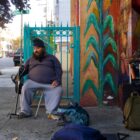Overdose Crisis
City Officials Lack Urgency to Prevent Overdose Deaths, Say Safe Consumption Proponents
Several weeks after a crucial legal hurdle blocking safe consumption sites in San Francisco was seemingly resolved, proponents said they were dismayed that city leaders and public health officials were still not greenlighting centers that could reduce deaths related to drug use.
Overdose deaths have reached 620 this year — on track to have the highest annual tally since counting began, with fentanyl causing the vast majority of fatalities, according to the chief medical examiner’s latest report.










